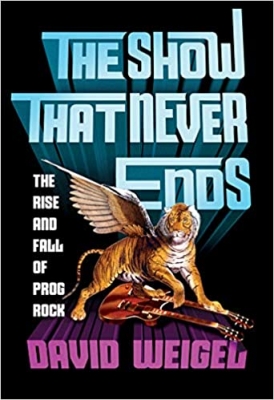The first style of music I called my own was Prog. My young teen mind was filled with complex arrangements and performances by the gods of progressive rock: Crimson, Yes, ELP, and the rest. The first album I bought with my own money was Fragile, the seminal album from Yes.
Prog eventually became the most uncool genre in music, but at one time it reigned supreme. When I met other kids who liked Prog, they tended to be pretty intelligent. More likely to be readers, thinkers. They discussed ideas and possibilities.
Writer David Weigel has chronicled the phenomenon in The Show That Never Ends: The Rise and Fall of Prog Rock. It's a wistful, informative, and ultimately heartbreaking book about the genre. From its origins in folk, classical, psychedelic, and jazz, to the critical and popular dismissal of prog, Weigel writes with deep affection for his subject. He cites Soft Machine as the first true Prog band, and traces the movement through the years when it was incredibly popular.
The images are indelible: Keith Emerson shoving knives into his keyboard. Rick Wakeman in his wizard garb. Robert Fripp's stern disciplinarian stage presence, Peter Gabriel's opulence in early Genesis, and swirling dervish Ian Anderson.
Punk was terrible for Prog. It took a few years, but the critics and the public turned their backs on progressive rock. I suppose it was necessary. The bands were ambitious, but the ambition began to look like indulgence. The music execs were demanding shorter, more pop-oriented songs. There was the inevitable interband feuding. The whole thing dissolved away.
One Prog musician mused the question, "What are we supposed to do, forget we know how to play?"
It didn't quite die. Weidel illuminates the groups who continue the prog tradition, like Marillion, Porcupine Tree, and Dream Theater.
At their best, Prog artists created ethereal music, with incredible musicianship, majestic concepts, and mind-blowing cover art. People can sneer all they want, but the greatest Prog albums---Close to the Edge, In the Court of the Crimson King, Brain Salad Surgery, to name a few--comfortably stand amid the best music ever recorded.
I had to wipe a tear or two away as I finished The Show That Never Ends. The final pages deal with Keith Emerson's depression, his deteriorating health, and suicide. Emerson was possibly the best musician in an arena where brilliance was the standard.
It makes me want to retire to my bedroom and crank up Tales From Topographic Oceans on headphones. Well, maybe I'll make it The Yes Album instead. I'm not that far gone.
Written by Mark Sieber
Prog eventually became the most uncool genre in music, but at one time it reigned supreme. When I met other kids who liked Prog, they tended to be pretty intelligent. More likely to be readers, thinkers. They discussed ideas and possibilities.
Writer David Weigel has chronicled the phenomenon in The Show That Never Ends: The Rise and Fall of Prog Rock. It's a wistful, informative, and ultimately heartbreaking book about the genre. From its origins in folk, classical, psychedelic, and jazz, to the critical and popular dismissal of prog, Weigel writes with deep affection for his subject. He cites Soft Machine as the first true Prog band, and traces the movement through the years when it was incredibly popular.
The images are indelible: Keith Emerson shoving knives into his keyboard. Rick Wakeman in his wizard garb. Robert Fripp's stern disciplinarian stage presence, Peter Gabriel's opulence in early Genesis, and swirling dervish Ian Anderson.

Punk was terrible for Prog. It took a few years, but the critics and the public turned their backs on progressive rock. I suppose it was necessary. The bands were ambitious, but the ambition began to look like indulgence. The music execs were demanding shorter, more pop-oriented songs. There was the inevitable interband feuding. The whole thing dissolved away.
One Prog musician mused the question, "What are we supposed to do, forget we know how to play?"
It didn't quite die. Weidel illuminates the groups who continue the prog tradition, like Marillion, Porcupine Tree, and Dream Theater.
At their best, Prog artists created ethereal music, with incredible musicianship, majestic concepts, and mind-blowing cover art. People can sneer all they want, but the greatest Prog albums---Close to the Edge, In the Court of the Crimson King, Brain Salad Surgery, to name a few--comfortably stand amid the best music ever recorded.
I had to wipe a tear or two away as I finished The Show That Never Ends. The final pages deal with Keith Emerson's depression, his deteriorating health, and suicide. Emerson was possibly the best musician in an arena where brilliance was the standard.
It makes me want to retire to my bedroom and crank up Tales From Topographic Oceans on headphones. Well, maybe I'll make it The Yes Album instead. I'm not that far gone.
Written by Mark Sieber
The author does not allow comments to this entry
No comments